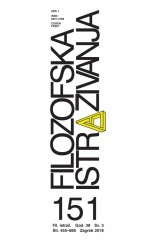Aristotelova psihologijska koncepcija značenja: παθήματα kao ὁμοιώματα
Aristotle’s Psychological Conception of Meaning: παθήματα as ὁμοιώματα
Author(s): Igor MartinjakSubject(s): Psychology, Epistemology, Semiology, Ancient Philosphy, History of Psychology
Published by: Hrvatsko Filozofsko Društvo
Keywords: affections in the soul; thoughts; images; likenesses; extramental reality; meaning; reference;
Summary/Abstract: In this paper, I investigate Aristotle’s psychological conception of meaning. I will show that in Aristotle’s De interpretatione we can find a conception of meaning that enables a response to typical objections such psychological accounts are facing with. According to my interpretation, it is required that thoughts are significata of our terms rather than mental images. Mental images could occur as subjective features of a particular mind in particular portion of time, whereas thoughts as an isomorphic likeness of the universal and necessary aspect of extramental reality provide ground for intersubjectivity required for an adequate account of meaning. In my interpretation, however reference is not fixed via likening relation because a mental content of nonreferring terms is also provided via likening relation between thought and two or many extramental things.
Journal: Filozofska istraživanja
- Issue Year: 38/2018
- Issue No: 03/151
- Page Range: 601-614
- Page Count: 14
- Language: Croatian

